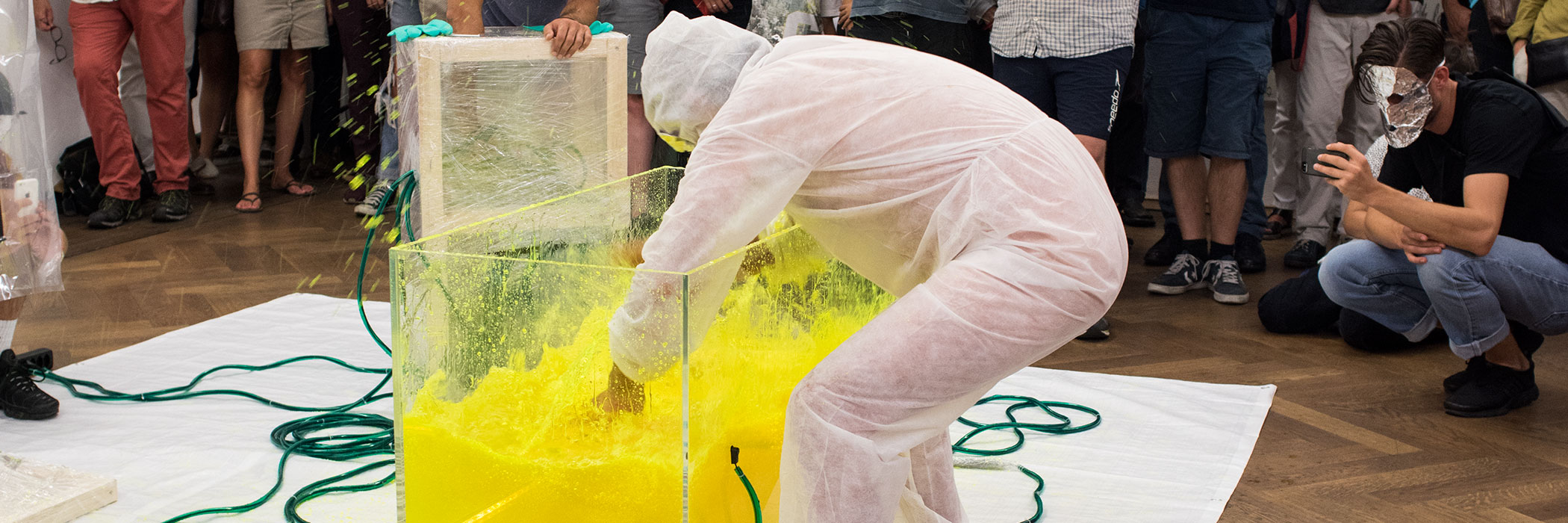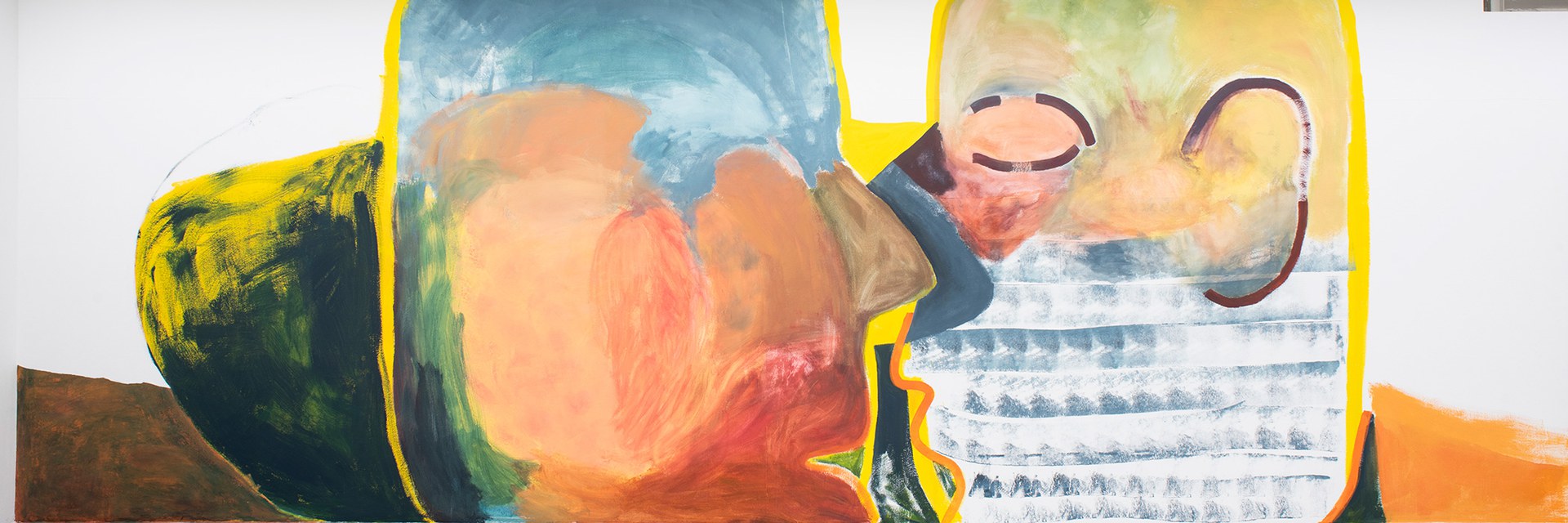Fine Arts BA
Studying Fine Arts fosters the develop of a distinct, individual artistic position. In the studio, in workshops, in project work and in the context of exhibitions students gradually develop their own artistic language.
Key data
- Degree
- Bachelor of Arts FHNW
- ECTS points
- 180
- Study start
- September (week 38)
- Next start
- Mon. 14.09.2026 | Fall Semester
- Final application date
- Sun, 22.02.2026
- Studying mode
- fulltime
- Duration
- 6 Semester
- Teaching language
- German (B2 or equivalent), partly in English
- Place
- Basel
- Stay abroad
- possible
- Application fee
- CHF 200.- (incl. aptitude assessment and enrolment)
- Semester fee
- CHF 750 (CH); CHF 1.000 (EU); CHF 1.250 (Not-EU/EFTA) Fees detail
Thank you for your interest in studying at the Basel Academy of Art and Design. The application deadline for a Bachelor's degree programme beginning in the fall semester 2026/27 has expired on February 22, 2026. The next application window for the fall semester 2027/28 opens on November 1, 2026.
Mobile navi goes here!
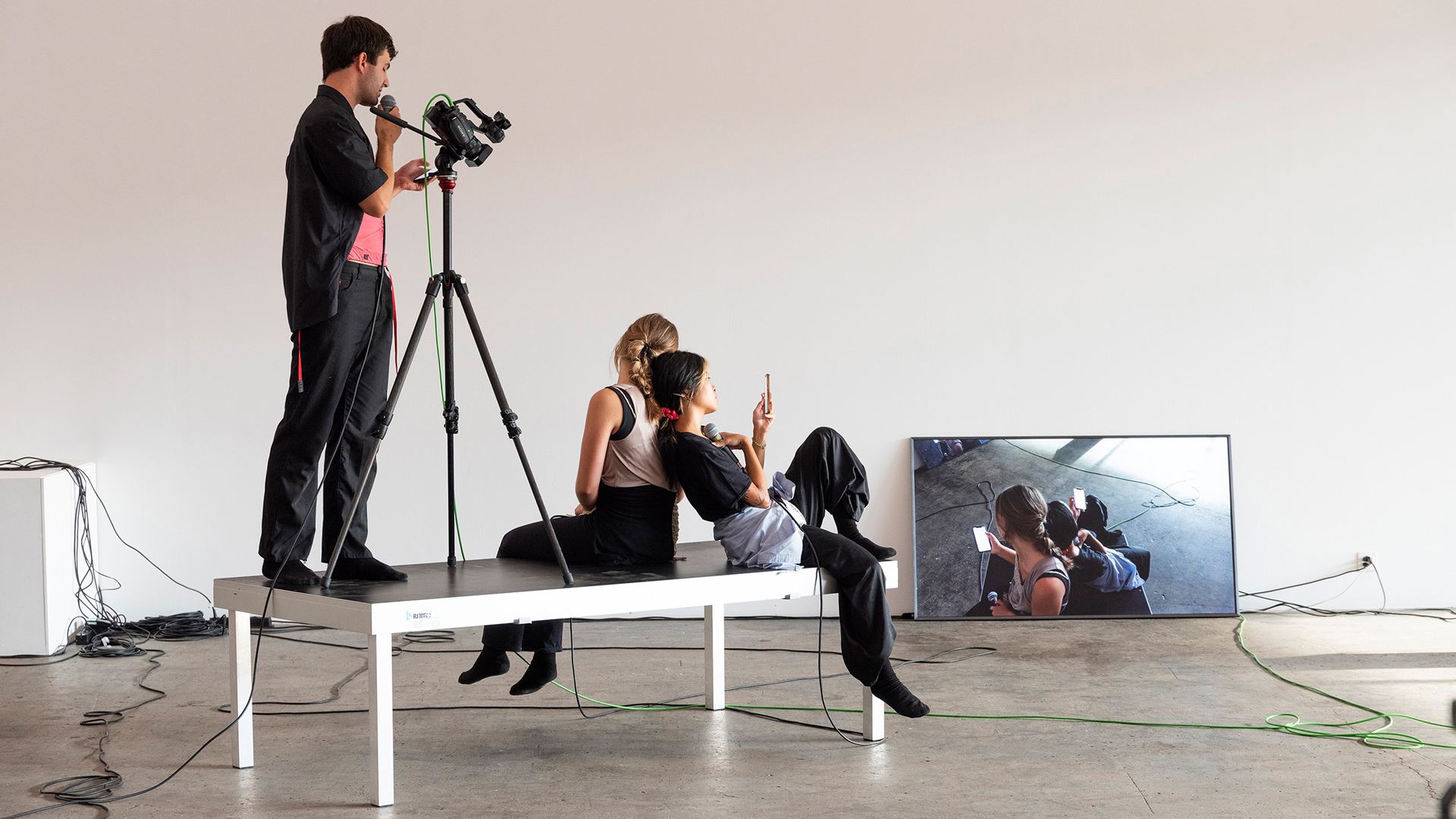

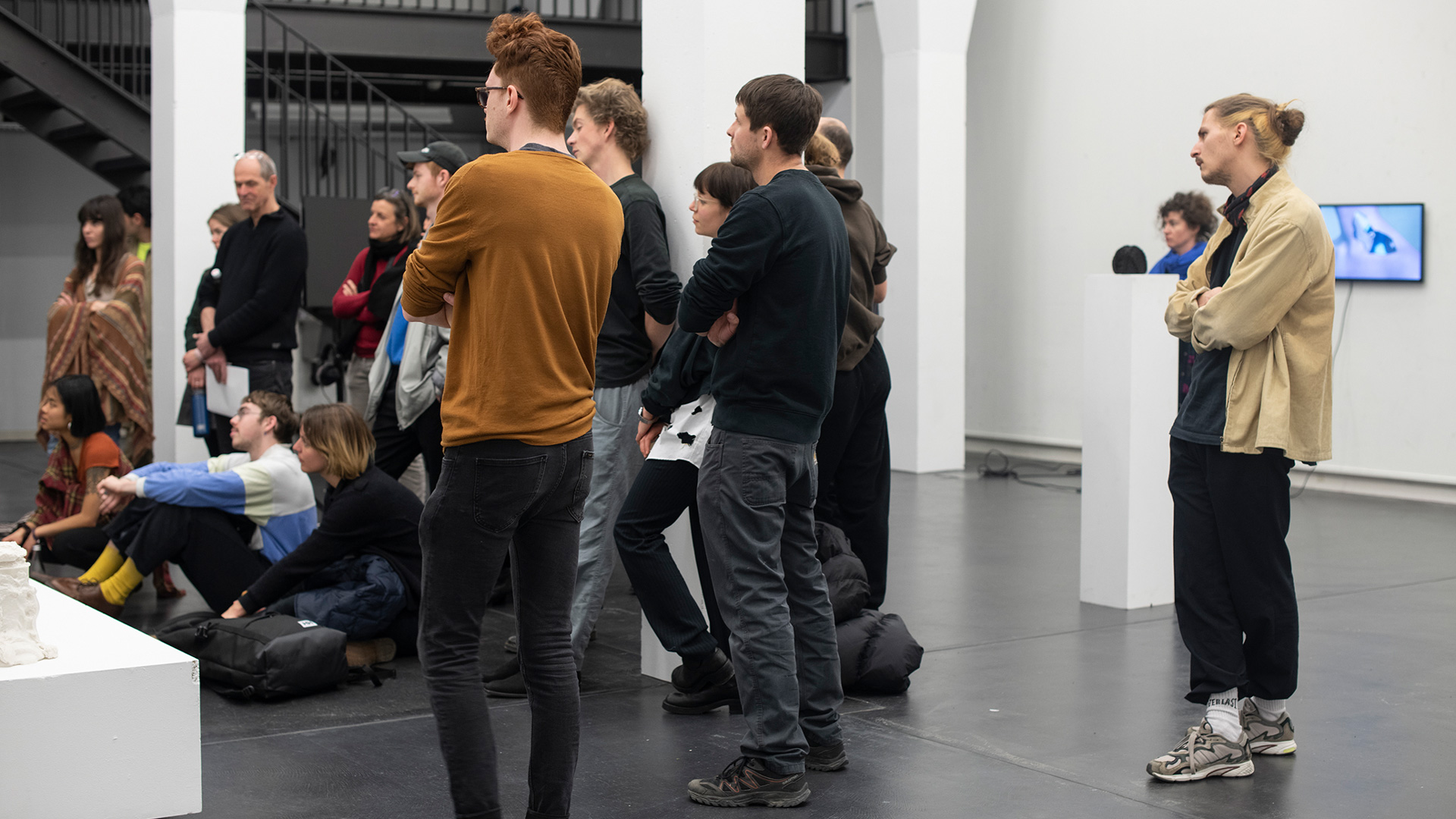
Information on programme contents
Studying Fine Arts fosters the develop of a distinct, individual artistic position. In the studio, in workshops, in project work and in the context of exhibitions students gradually develop their own artistic language. The study programme demands a high degree of self-initiative. Studying art means becoming familiar with art. Artists are pioneers who seek to link up apparently disparate worlds in new ways and by new means. They redefine the language of traditional media, materials and technologies by creating artworks, developing concepts, writing essays, exploring archives and choreographing bodies in space. Artists are interested in the never-ending task of experiencing and representing what we call reality in new ways.
Study structure
The content of the three years of study is divided into modules: ‘Art and Practice’, ‘Art and Communication’, ‘Art and Reflection’, ‘Art and Presentation’, as well as the ‘Basic Thesis’ in the first and second years and the ‘Bachelor Thesis’ in the third year. These furnish you with sound practical and theoretical knowledge for your artistic practice. Each module consists of a variety of classes. In addition, you will attend CoCreate, the programme featuring courses and lectures offered by all the bachelor degree programmes. The 140 or so CoCreate courses offered every year find students working in collaborative, interdisciplinary and experimental groups. Representatives of all the degree programmes and students are involved in the development of the teaching content and formats.Study structure
The content of the three years of study is divided into modules: ‘Art and Practice’, ‘Art and Communication’, ‘Art and Reflection’, ‘Art and Presentation’, as well as the ‘Basic Thesis’ in the first and second years and the ‘Bachelor Thesis’ in the third year. These furnish you with sound practical and theoretical knowledge for your artistic practice. Each module consists of a variety of classes. In addition, you will attend CoCreate, the programme featuring courses and lectures offered by all the bachelor degree programmes. The 140 or so CoCreate courses offered every year find students working in collaborative, interdisciplinary and experimental groups. Representatives of all the degree programmes and students are involved in the development of the teaching content and formats.
Modules
Art and Practice
This module comprises the semester presentations as well as a written assignment in the fourth semester and the preparation for the bachelor thesis in the sixth semester. This module comprises the semester presentations as well as a written assignment in the fourth semester and the preparation for the bachelor thesis in the sixth semester.
Art and Communication
Since the ability to engage in discourse and handle critique competently are important in the development of artistic processes, students learn to master these skills in regular discussions with lecturers as well as in sessions with co-students, allowing them to talk about their own artistic work, as well about art in general in exhibition contexts. Art and Reflection In this module students work on their reflective skills and theoretical knowledge with regard to their own work as well as general methodology. In particular, they acquire knowledge in basic cultural-scientific fields and specific art theoretical issues.
Art and Reflection
In this module you develop reflective theoretical knowledge with regard to your own work and gain a sound foundation in general theory. Emphases include basic knowledge in cultural history and selected art theoretical questions.
Art and Presentation
In addition to the work presentations each semester, this module comprises all the important exams in the three-year BA degree course, including the Basic thesis and the BA thesis. Apart from showcasing their own artistic work in the context of a presentation or exhibition, students are asked to write a mentored paper to test their written reflective skills.
Basic Thesis
The students develop an artistic assignment for the exhibition 'BASIS’, which takes place at the end of the first and second year. They are supervised by the Forum’s lecturers as well as technical staff.
Bachelor Thesis
The Bachelor Thesis module comprises the planning and realisation of an artistic assignment to be presented to the public in the diploma exhibition, the writing of a written assignment, as well as the examination preparation and the oral examination. As part of this project work, you will learn to develop solution strategies based on a specific question and to design, test, implement, communicate and analyse open, dynamically developing projects in interdisciplinary teams.
We expect of our students a high degree of curiosity and a willingness to develop an enhanced sense of what they themselves create and what others bring into being. Prerequisite is the ability to think differently. We expect from students to be able to comprehend modes of thought different to their own. The Institute of Art appreciates students who feel drawn to the unknown and who wish to join the debates on creating art.
Finding one’s own voice takes time. The Institute of Art is willing to support you on this journey when and wherever it can. Studying art offers no clear-cut answers but it can you help find and formulate the right questions. We want you to understand that these questions – the questions of art – lead a public life.
Goals and benefits
The three-year Bachelor course introduces you to issues of current-day art practice and helps you to develop your own work approach. It is not a training in art history; instead you gather experience and are confronted with a wide array of ideas, forms, media, materials and questions relating to matters such as individuality. Apart from working in the studio, group discussions with other students and lecturers form a core of the course. On a regular basis artists and art theoreticians from Switzerland and abroad are invited as visiting scholars to support you in your studies. In the three-year BA course you acquire technical skills and expand your knowledge concerning the questions and topics that drive today’s art practice.
Career prospects
The BA degree programme in Fine Arts lays the foundation for understanding oneself as an emerging artist.
With its studios and central Campus.Workshops, HGK offers ideal conditions for combining craft curiosity, the acquisition of technical skills, and the necessary digital know-how. In addition, all students have their own 24/7 workspace in one of the spacious studios. Students also have access to the Institute’s internal workshops for analogue and digital media as well as the required equipment and software. On top of that, the institute also has its own exhibition space – the TANK – which can be used by students.
Information on admission, aptitude assessment and admission to the study programme
Educational requirements
Admission to the aptitude assessment for the bachelor’s degree in Fine Arts requires one of the following qualifications:
- a certified vocational baccalaureate
- a certified specialized baccalaureate
- a certified upper secondary school (level II) baccalaureate
- proof of an equivalent educational degree at an upper secondary school (level II) obtained otherwise (Swiss education system)
Language of tuition
The language of tuition is German (B2 or equivalent) and partly English. Proof of language proficiency is required at the start of the degree programme.
Workplace experience or preparatory course in design.
One year of practical workplace experience or completion of a preparatory course are not mandatory, but recommended.
is a list of approved vocational trainings and professional fields, respectively
Catching up on the vocational baccalaureate
Applicants who have not completed at least three years of upper secondary schooling (level II) are not legally entitled to admission to a Bachelor's degree programme. Information concerning full-time or part-time on-the-job training courses focusing on a vocational, design-based or specialized baccalaureate is provided by the local vocational colleges.
Admission on the basis of exceptional talent (1)
In exceptional cases, applicants can be admitted to the Bachelor’s degree programmes without being in possession of an upper secondary school (level II) certificate (Swiss education system), namely if they can provide proof of exceptional talent, either in a design-related or an arts-related field.
Note: We recommend that you make enquiries by means of an email to the office of the respective degree programme at admission.BA-kunst.hgk@fhnw.ch at least two weeks prior to the application deadline (15 February), or arrange an appointment with the Head of the degree programme.
____________
(1) If you are in possession of one of the following educational degrees, you are eligible for this mode of admission:
Federal Certificate of Vocational Proficiency EFZ (apprenticeship), Professional Certificate EBA, Specialized Secondary School (FMS), Compulsory Schooling, no educational qualification
To apply for a place at the HGK, the required documents must be submitted by 15.02.2026.
Please send the specific enquiries to email address.
Dates 2026
- 01.11.2025
Publication of the detailed information on the aptitude assessment - 22.02.2026
Registration deadline and deadline for submitting the required documents for the aptitude assessment. - 07.- 11.09.2026
Introductory weeks at the HGK Basel (mandatory) - 14.09.2026
Fall Semester begin 2026/27
Here you will find answers to FAQs about preparing and registering for a Bachelor’s (BA) or a Master’s (MA) degree programme at the HGK Basel FHNW.
Here you will find answers to organizational, administrative and legal questions all about studying -->
Further Information Fine Arts

Public transport
The campus is easy to reach by public transport. The stop Freilager on BLT line 11 is immediately in front of the Campus (from Bahnhof SBB in direction Aesch)
By car
Leave the motorway A2 at the junction Basel-St. Jakob and follow the sign Dreispitz. Approaching from Münchensteinerstrasse enter the Dreispitz complex through Gate 13 and park your car in one of the public car parks (Ruchfeld or Leimgrube). When setting your satnav, please note that the Freilager complex is part of the municipality of Münchenstein, Canton Basel-Landschaft.
Access by car for people with disabilities
Choose the access via Florenz-Strasse in the direction of the High-rise building (Building D). To lower the bollard at the gates of the campus please ring the bell. You will be connected to our reception in Building D.
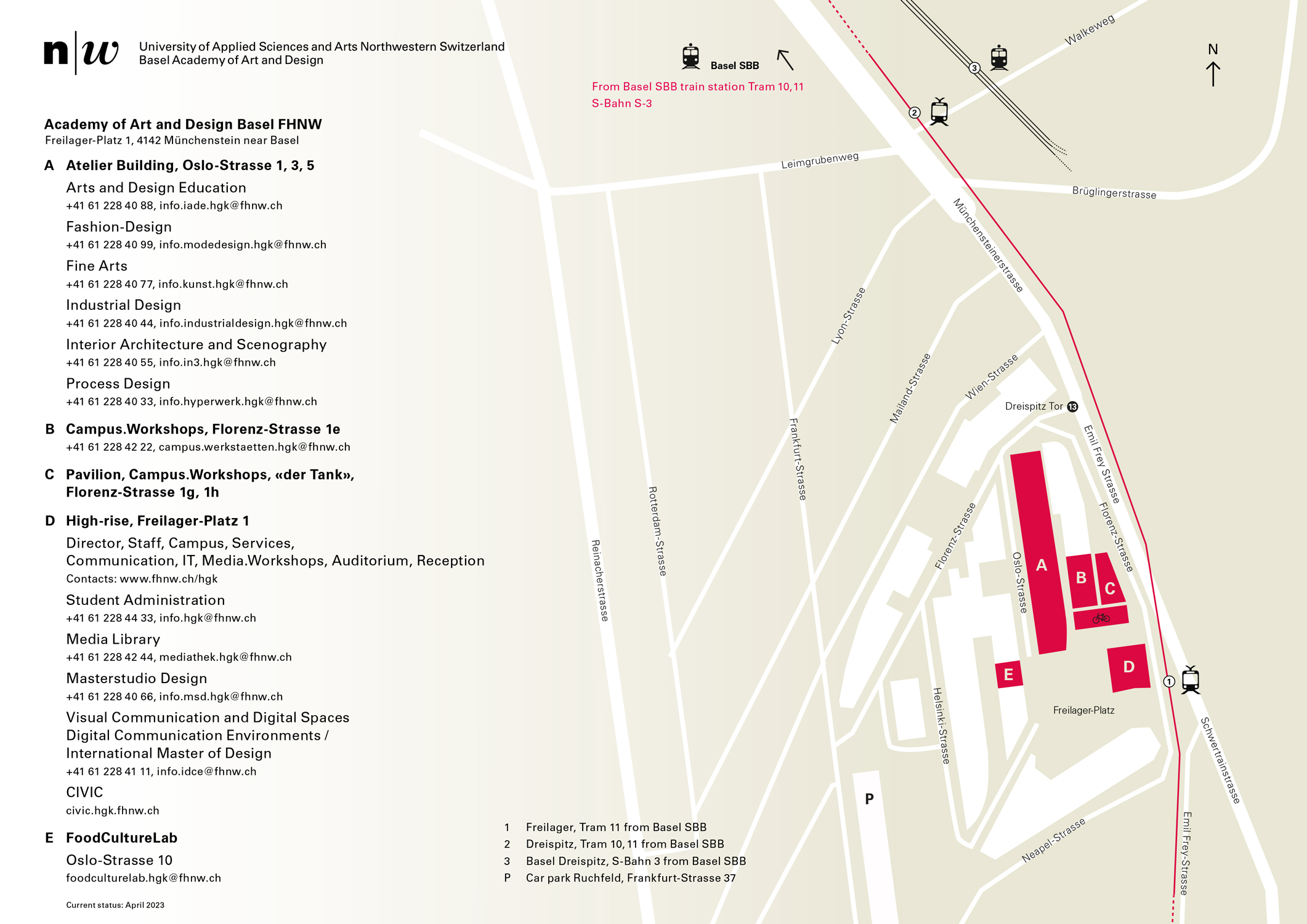
The buildings of the HGK Basel are accessible by wheelchair, stroller, and for people with walking difficulties. The entrance to the highrise building (Building D) is at ground level, the studio building (Building A) can be reached via a ramp. There is at least one lift in both buildings.
Access by car for people with disabilities: See Gender-neutral toilets: See ‘Getting there‘.
Toilets for people with disabilities:
Highrise building (Building D): Ground floor to 8th floor in the centre of the building
Studio building (Building A): Ground floor to 3rd floor, southern section of main corridor
Gender-neutral toilets: See ‘All Welcome WC’.
Parent-child-room: See 'Parent-child-room'.
Basel Academy of Art and Design FHNW
Institute Art Gender Nature (IAGN)
Postfach
(P.O. Box)
CH-4002 Basel
Basel Academy of Art and Design FHNW
Institute Art Gender Nature (IAGN)
Oslo-Strasse 3, Ateliergebäude: A 1.10
4142 Basel/Münchenstein
T +41 61 228 40 77
M info.kunst.hgk@fhnw.ch
No social media links available.
